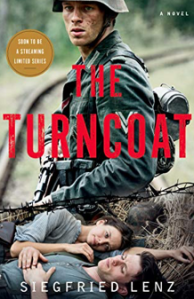

The Turncoat, published posthumously in 2016 for the first time, was actually Siegfried Lenz’s second novel. His first novel Es waren Habichte in der Luft came out in 1950. Because it was successful, the publisher signed a contract for a second novel with Lenz. The first draft of the manuscript received a lot of praise but after he rewrote parts of it and handed it in for a second time, the publisher refused to publish it. They didn’t want a novel on a deserter who joined the partisans. The novel was forgotten until 2014, when Lenz told his publisher about it.
The Turncoat tells the story of Walter Proska, a Wehrmacht soldier. It is set on the Eastern Front, towards the end of the war, during summer 1944. The Wehrmacht has already withdrawn from the front, but there’s still a ramshackle Fortress, in the middle of the forest. After almost being blown-up by Polish partisans, Proska, who was looking for his unit, is told to stay at the Fortress. The Fortress is located near the Ukrainian border and run by a Corporal who is constantly drunk and gives the most absurd and shocking orders. It looks like he’s gone completely mad. The Fortress is populated by a motley crew of simple soldiers. Among them is a cook who has a chicken as a friend, a young student whose philosophical ideas slowly awaken Proska, and a soldier who mounts young birch trees in sexual frustration.
Days at the Fortress are absurd and boring. They are filled with dangerous patrols, disgusting food, mosquitoes, and orders the soldiers don’t feel like following. They are surrounded by partisans who try their best to kill them all. After finally being overrun by partisans, Proska and the young student join them.
There is a sort of love story between Proska and a young Polish woman who belongs to the partisans. He meets her before he joins the unit and later again in the woods.
I was surprised by this book. I expected something a little different. Not a book with such a colourful cast of droll, whimsical characters. The novel is satirical, which served to underline the absurdity of these last days of war. The soldiers wonder constantly what the heck they are doing there. What’s going on? What are they fighting for? Not one of these characters is a patriot. They are conscripts and couldn’t care less about the war; they want it to end and go back home.
While it had so many amusing, bizarre scenes, I still found it hard to read. There are several instances of cruelty against animals. Some in flash backs, some happen during the story. Animals and the way they are treated or mistreated is a frequent trope in war stories. It mostly serves to either emphasize that people have lost their humanity or that they are worse than animals. The scenes are short but I still found them upsetting.
What I liked the most was the writing. Lenz is a powerful, evocative, and very descriptive writer. I loved the symbolism, the figures of speech that run through the novel, especially in the nature descriptions. I also liked the way the characters were described. Each one of them is so different, quirky. Their dialog is often sarcastic and humorous. My only reservation regards the ending. I found it a bit confusing, but that didn’t lessen my appreciation of this book. The Turncoat is one of those novels that show the cruelty and absurdity of war. There are no heroes here, no winners, only losers.
The Turncoat has been made into a mini-series. Unfortunately, I couldn’t find an English trailer.
